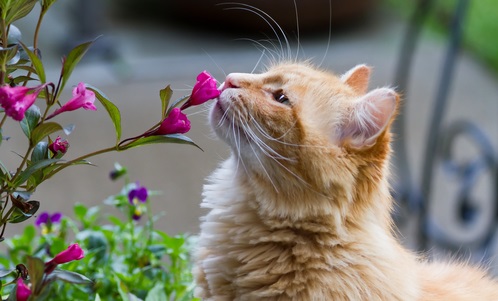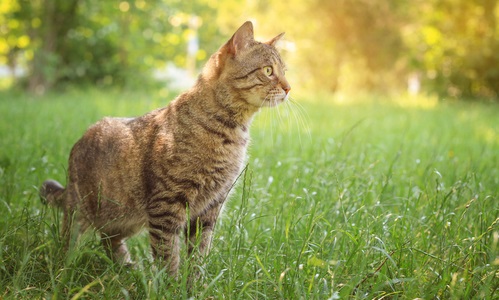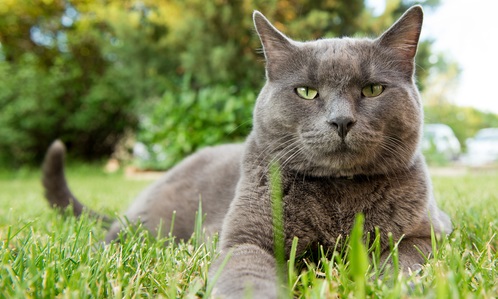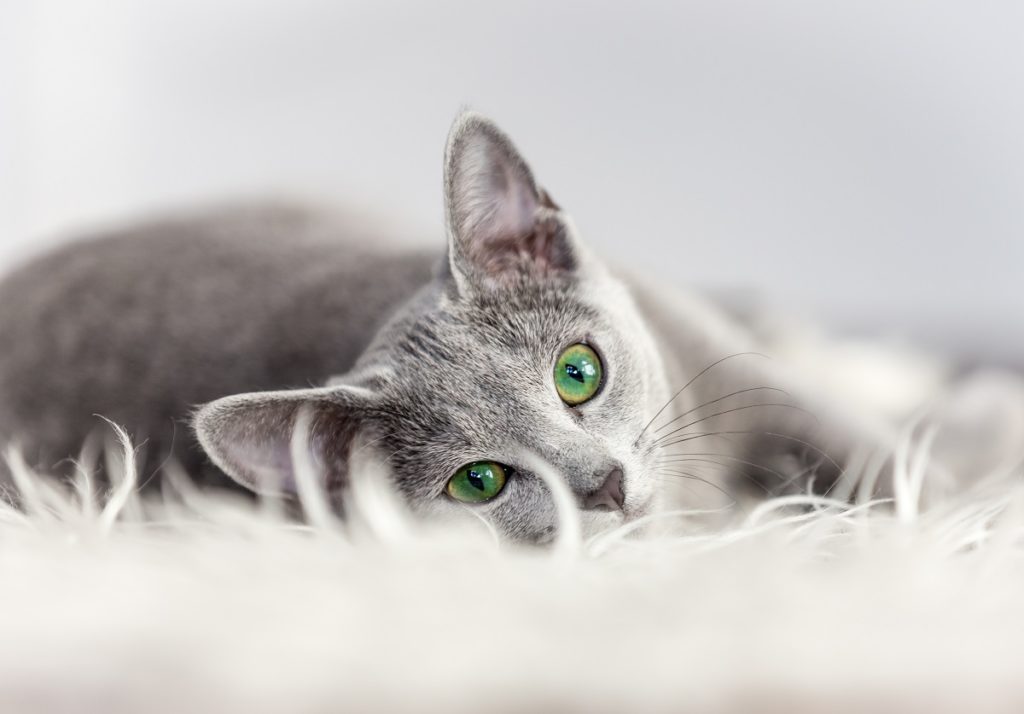In many ways, cats are arguably nature’s most graceful predators – sleek, fast, and extremely agile, capable of stunning speed and endurance. Except, of course, when asthma strikes. Much like the human equivalent of the ailment, feline asthma can be caused by a wide variety of triggers, and can present varying degrees of severity.
As a conscientious pet parent, it’s always disconcerting to see and hear one’s fur baby struggling with an illness, but asthma can be particularly frightening: in addition to the hallmark asthmatic wheezing, coughing, mucous, and even poor oxygen intake can occur, threatening a beloved cat’s health. This article will address the many aspects of asthma in cats, including common symptoms, treatment options, what to avoid, and how to make asthmatic cats as comfortable as possible.
Does My Cat Have Asthma?
 In order to treat an illness, it needs to be identified – that’s why many cat owners rush to judgement when they hear their cat struggling to breathe or wheezing. There are, however, many symptoms that may seem like asthma at a glance, but are easily explained and don’t point to a medical emergency at all.
In order to treat an illness, it needs to be identified – that’s why many cat owners rush to judgement when they hear their cat struggling to breathe or wheezing. There are, however, many symptoms that may seem like asthma at a glance, but are easily explained and don’t point to a medical emergency at all.
Here are some of the most common asthma symptoms in cats, along with potential alternate –and less worrisome – causes:
- The Symptom: Wheezing
While it may be asthma, it’s important to note when a cat starts wheezing – and for how long the pet seems afflicted. Similar to when humans pant and wheeze after heavy exertion, if a cat has just finished stalking a fly across the room or chasing “the red bug” when his pet parent is using a laser pointer toy, he might just be tuckered out. This is particularly true if the family cat is obese or mostly sedentary – keep an eye on him and see if he seems to recover quickly after he stops moving. If so, chances are your cat’s wheezing isn’t asthma.
The Symptom: Persistent Coughing
Most feline vocalizations – with the exception of females in heat – lean towards mostly melodic meows and deep purring, if they’re audible at all. For that reason, feline coughing will be quickly apparent and worry-inducing, particularly if other concerning health symptoms are present.
Much like timing any wheezing, take note of when a cat is coughing: could he have inhaled dust or a powder that is irritating his lungs? Has an air freshener been sprayed in his vicinity in the last few minutes? Cats cough for the same reason their owners do: to clear their throat and breathe more freely. If a cat’s cough lingers, it still might not be asthma: they may just have a cold.
The Symptom: Open Mouth Breathing
Cats will breathe through their nose the majority of the time, but sometimes owners may notice his mouth open instead. There’s a perfectly normal explanation for some open mouth breathing in cats: they pull air in their mouths to taste the air and better scent something unusual. If they come across something “stinky,” like a dirty sock or even a fellow cat in heat, they’ll lean back from the source with an open mouth because they’re still sampling the fragrance.
Just as snakes use their tongues to determine the safety and contents of their environment, cats use open-mouth breathing to heighten their acute sense of smell. The only time to be worried about this behavior is if it is observed along with rapid panting, or the cat otherwise looks like he is struggling to breathe normally.
The Symptom: Coughing Up Foam / Mucous
Any feline parent that has spent enough time around their cat will instantly recognize “the position”: the cat’s body is low to the ground, his neck is extended, and loud “urp” noises are coming in quick succession. It usually means one thing – a hairball is coming, and there’s a good chance that it’s going to land on something that’s hard to clean up. Sometimes, however, the hairball never materializes and he instead coughs up foam and bile.
Cats don’t treat feline vomiting with the same concern humans do: to them, it’s simply a matter of clearing out grooming-ingested fur or food that isn’t sitting well with them. They feel poorly, they throw up, they feel better and go about their business, leaving their annoyed parent to clean up the mess. Unless the cat is coughing up debris and mucous every day, failing to keep food and water down regularly, or there’s blood present, there’s not an immediate cause for concern.
The Symptom: Lethargy / Weakness
Of all the symptoms cats can exhibit, lethargy is the hardest one to pin down: cats sleep up to eighteen hours a day, after all. One of the best ways to see if the family cat is simply enjoying his beauty rest or genuinely struggling to stay awake is to open a can of his favorite wet food several rooms away. If he doesn’t immediately come to see if it’s time for delicious treats, and he hasn’t eaten recently, there’s a good chance that his tiredness might be caused by an ailment.
Several days in a row of this behavior is worth a vet visit. Because cats naturally try to conceal any injuries or pain (a holdover from their wild predecessors, to avoid predators), a medical checkup is the only way to definitively rule out sickness or asthma-related lethargy.
Asthma and Cats: How to Treat it and Keep Your Cat Comfortable
 What should you do, then, if it turns out your cat does have asthma? Again, much like humans, there are a variety of treatments available to help an afflicted cat stay comfortable and healthy despite his asthma. It’s important to remember that asthma, even if there are long periods between attacks, is a lifelong diagnosis for a cat. The treatments mitigate the symptoms of asthma, but it will never go away completely. Below, some treatments that may be prescribed by a vet for asthmatic cats:
What should you do, then, if it turns out your cat does have asthma? Again, much like humans, there are a variety of treatments available to help an afflicted cat stay comfortable and healthy despite his asthma. It’s important to remember that asthma, even if there are long periods between attacks, is a lifelong diagnosis for a cat. The treatments mitigate the symptoms of asthma, but it will never go away completely. Below, some treatments that may be prescribed by a vet for asthmatic cats:
Weight Loss
Obviously, this approach is only viable for cats that are overweight, and should not be used for cats that are already at an optimal size. The idea behind this technique is that obesity in cats can have negative effects on the issues already occurring: a constricted air passage becomes harder to clear with excess weight around it. Feline obesity is not the cause of asthma, but it does exacerbate it. A trusted vet will be able to recommend a diet and exercise regimen that works best for an overweight asthmatic cat.
Injectables
Generally only used in extreme situations, if pet parents bring their cat into an emergency vet during a serious asthma attack, the physician may use an injectable. If a pet cat’s asthma is severe or life-threatening enough to warrant it, the vet may prescribe and instruct owners on how to administer an injection in the event that the cat goes into respiratory distress.
Inhaled Medicines
Because their facial fur prevents a tight seal, administering an inhaled feline bronchodilator can be particularly tricky. Typically, a “spacer” – a long tube designed to allow the powdered medicine particles to mix freely with the air before inhalation – is used in conjunction with a mask. The difficult part is, of course, getting a testy cat to wear the mask and sit still long enough to inhale the proper dosage of medicine.
Oral Medications
Some feline-approved steroids can strengthen the tissues that normally become inflamed and constricted during an asthma attack in cats. Vets may prescribe a course, or potentially even a daily medication, to help an asthmatic cat’s natural defenses fight off asthma attacks.
For cats who struggle to take pills, try wrapping him in a towel, placing the pill in the back of his mouth, holding his mouth closed, and gently rubbing his throat with a downward motion to induce swallowing. Alternately, syringe-like oral pill administering tools are available for sale for quick and easy delivery of the pill into his mouth. Be aware, however: pet parents will still need to watch after application to make sure he doesn’t cough up or spit the pill out.
Environmental Assessment For Cats: Avoiding Asthma-Inducing Irritants
When cat allergies or asthma strike, veterinarians look towards their patient’s living situation with a critical eye. Because asthma can be triggered by almost anything, irritants like dust, pollen, fur from other pets, and ashes from fireplaces or incense should be cleaned and removed from the cat’s living area. Below, some commonly-recognized irritants that can be wreaking havoc on an unsuspecting kitty:
Diffusers: It’s important to note that diffusers, special small appliances used to turn essential oils and water into a fine, room-filling mist, are extremely unhealthy for cats. They are very popular and sold in a variety of stores; many cat owners are completely unaware of the environmental risks they pose. Not only are cats’ lungs unsuited to breathing in aerosolized oil, they will also ingest the oil particles that settle on their fur as they groom. Diffusers can cause feline asthma to worsen, and have additional negative health effects depending on the type of oil(s) used in them. Avoid using oil diffusers in a cat’s living space.
Smoke: Likewise, if anyone in the household smokes indoors, the secondhand smoke is doing significant, lasting damage to the family cat’s lungs. While he can move to another room to avoid direct inhalation, his nose and throat are far more sensitive than a human’s, and thus more likely to get irritated and inflamed. Vacuum often to keep asthma-triggering particulates out of carpets and furniture, and invest in an air purifier if dwelling in an area with a high pollen-count. Not only will these measures help to avoid triggering the cat’s asthma, but everyone in the home will be breathing more easily as well. In addition to limiting inhaled smoke, don’t forget about ambient smoke, such as incense and fireplace fumes.
Heavy Perfumes: Your cat’s nose is meant to scent prey, finding a particular scent among an almost endless variety of natural odors. When they live entirely inside, their palette of smells is much smaller and potentially overwhelming. When outdoor feline ancestors scented prey, any strong smells in the immediate vicinity could dissipate into open air. Inside, those scents are held by walls, windows, and doors, which means your cat still smells bacon grease from three days ago that you’ve already forgotten. Strongly scented perfumes, hair products, deodorants, and even laundry detergent can set off feline asthma in close quarters. Try to air out the rooms in which these products are used whenever possible, and keep air fresheners and scented candles to a minimum.
Dust: HEPA-filtered vacuums are the best tool in the endless battle against home dust, at least as far as a cat’s asthma is concerned. In addition to the dust human beings naturally produce, irritating particles of pollen and other allergens are carried in on clothes and shoes as well. Frequent vacuuming will keep these unwanted intruders at bay, ensuring the kitty can enjoy his home without worrying over shortness of breath, wheezing, and difficulty breathing.
 Mold and Mildew: For cats who live primarily in a basement or attic, he could be struggling with mold and mildew triggering his asthma. If a musty smell is noticed where the animal usually spends his time, it’s clearly part of the culprit behind his asthma attacks. Make sure to wash his linens frequently to keep the scents from settling into his sleeping area. Try to coax him to spend time in areas that aren’t as badly affected as the attic or basement.
Mold and Mildew: For cats who live primarily in a basement or attic, he could be struggling with mold and mildew triggering his asthma. If a musty smell is noticed where the animal usually spends his time, it’s clearly part of the culprit behind his asthma attacks. Make sure to wash his linens frequently to keep the scents from settling into his sleeping area. Try to coax him to spend time in areas that aren’t as badly affected as the attic or basement.
Litter: While a necessity for a healthy, happy cat, the wrong kind of kitty litter can actually cause more problems than it solves. For cats with known respiratory disorders, such as asthma or severe allergies, aim for “low dust” formulas or pellet-style litter, and unscented varieties of each whenever possible. For owners who’ve avoided switching litter brands for fear he’ll start having accidents in protest, start a 1:1 mixture of new and old brands and slowly taper off of the “old” brand with each cleaning session.
Summary
A cat may not be able to carry an inhaler in his pocket, but with some thoughtful changes to his living environment and the right medical care, his asthma will have little to no effect on his health and happiness. Millions of humans live with asthma every day, and cats can – with the help of their pet parents – have a rich, full life too, asthma or not.
Sources Cited:
- “Asthma Symptoms in Cats.” Pets.WebMD.com, (no publish date), https://pets.webmd.com/cats/asthma-symptoms-cats#1. Accessed May 29, 2019.
- Reneiro, Carol, DVM, PhD, DACVIM (SAIM). “Treatment of Feline Allergic Asthma.” American Veterinarian.com, October 12, 2018, https://www.americanveterinarian.com/journals/amvet/2018/october2018/treatment-of-feline-allergic-asthma. Accessed May 29, 2019.
- “Caring for a cat with asthma.” Blue Cross For Pets (bluecross.org.uk), (no publish date), https://www.bluecross.org.uk/pet-advice/caring-cat-asthma. Accessed May 29, 2019.
- “Asthma in Cats.” VetStreet.com, November 28, 2011, http://www.vetstreet.com/care/asthma-in-cats. Accessed May 29, 2019.




